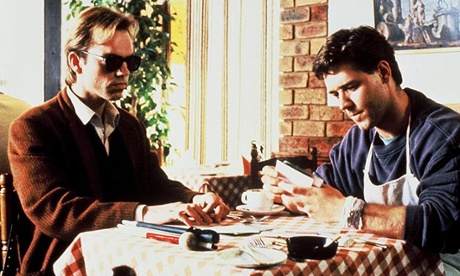
Proof’s opening credits are interchanged with a series of photographs. They depict the sky, trees, a park bench, flowers, a dog. Many are off-angle and imperfectly framed. We learn why when we discover who took them.
The premise of Jocelyn Moorhouse’s 1991 classic Proof, about a blind photographer who uses a camera to record places he visits, sounds a little like a novelty. But the low-budget production (which won six AFI awards, including best film) is far from gimmicky. Like its protagonist, it’s a tough one to second guess.
Martin (Hugo Weaving) is a complex creation. He’s not exactly a kind-hearted magnet for pity or a charming rascal like Al Pacino’s retired army officer (“hoo-ah!”) in Scent of a Woman. Neither a hero nor a villain, and deserving of both empathy and suspicion, Martin is a crusty creature: jaded, bitter, distrustful and impossible to forget.
His most vivid memory is a recollection of his mother taking advantage of his blindness to lie to him as a child. At least, that’s a belief he’s held on to. Moorhouse (who also wrote the screenplay) puts a question mark over that memory. This feeds into one of the of the film’s key propositions: that truth can be both created and destroyed by perception.
Martin’s housekeeper, Celia (Genevieve Picot), carries on like an evil stepsister, tricking him, mocking him and performing nasty sleights like luring his seeing eye dog away. Her nefarious ploys are made more complicated by an erotically charged attraction to Martin. He not only realises this but keeps her in the job because of it, preferring to deal with malicious behaviour than with pity.
Russell Crowe is earthy and unprepossessing as Andy, a decent but naive kitchen hand moulded in the style of a small-town boy bumbling his way through jobs and relationships. Andy earns Martin’s trust. A proud man forced to be humble by virtue of circumstance, a conflicting urge that provides a large part of Proof’s pathos, Martin asks his new friend to describe his photos.
Proof embraces an idea taken to cartoony extremes in movies such as Takeshi Kitano’s Zatōichi and Mark Steven Johnson’s superhero romp Daredevil: that people without one sense use their others to an extraordinary ability. Martin knows when lights are flickering because he hears them. He knows when a woman is wearing expensive perfume because he smells it.
Proof is also a portrait of an artist’s conflicted relationship with their medium of choice. Martin may not be capable of seeing his photography but his understanding of the format runs deep. He knows that while settings and situations change photographs remain the same; the artist ages but the art remains frozen in time. There is an irony in Martin’s obsession with pictures of objects and locations. The actual proof he craves lies in emotional rather than factual truth, an idea the film teases out gradually, as an extension of deep-seated feelings towards his mother.
When you think you have Proof pegged as an odd couple bromance complicated by the presence of a scheming third wheel, Moorhouse steers it somewhere very different, into a story about temptation, betrayal and ultimately forgiveness.
And yet, Proof isn’t a depressing down-in-the-ditches tale of a bitter unrepentant loner. It is an enormously compelling character study and a triangular drama buoyed by three fine performances – one in particular. Weaving (in one of his first major roles) asks us to care without asking us to pity. His portrayal of Martin is both pig-headed and vulnerable, key to the heart and soul of it.
Hollywood would probably have turned Moorhouse’s concept into a cheesy soap opera. In Proof you won’t find a rousing speech at the end or a scene in which Martin bravely blazes his way through oncoming traffic. The film is far more interesting because of it.
• Jocelyn Moorhouse’s new film The Dressmaker, with Kate Winslet and Judy Davis, opens in 2015

